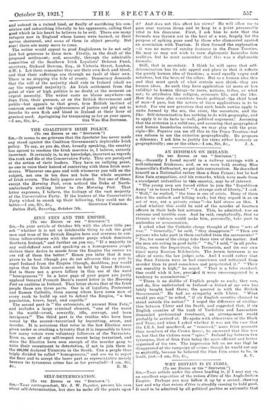SINN FEIN AND THE EMPIRE.
[To THE EDITOR Or THE " SPECTATOR."] Ste,—In your article of October 8th with the above title yeu ask " whether it is not an intolerable thing to ask the good men and true of the British Empire here and overseas to con- tinue fellow-citizens with the murder gangs which dominate Southern Ireland," and further on you- say, " If a majority in any well-defined area and speaking as a homogeneous people declare their desire to secede from the Empire the sooner we are rid of them the better." Hence you infer that it may prove to bo best (though you do not advocate this as yet) to expel Ireland from the Empire (though, doubtless, you would agree that the Irish coasts must be held by Great Britaiu). But is there not a grave fallacy in this use of the word " homogeneous "? In a later page of your paper you justly applaud General Prescott Decie's recent letter in the Morning Post on realities in Ireland. That letter shows that of the Irish people there are three parts. One is of loyalists, Protestant and Roman Catholic, from among whom have come men of every rank to build up and to defend the Empire, "a fine population, brave, loyal, and capable."
The second part is " the extremists, at present Sinn Fein," and includes a large criminal element, "one of the worst in the world—cruel, cowardly, idle, corrupt, and born intriguers." The third part is the residue who have been cowed by the second—terrorized by boycotting, arson, and murder. It is notorious that votes in the last Election were given under so crushing a tyranny that it is impossible to know how many voters were voluntary followers of the Terrorists. Even so, men of any self-respect resent being terrorized, and since the Election have seen enough of the murder gang to raise their resentment to detestation, if not to join them to the 400,000 declared Unionists in the South. Can a people thus triply divided be called " homogeneous," and are we to reject the finer and to accept the baser part as representative merely because its tyrannous crime has so far prevailed?—I am, Sir,






































 Previous page
Previous page